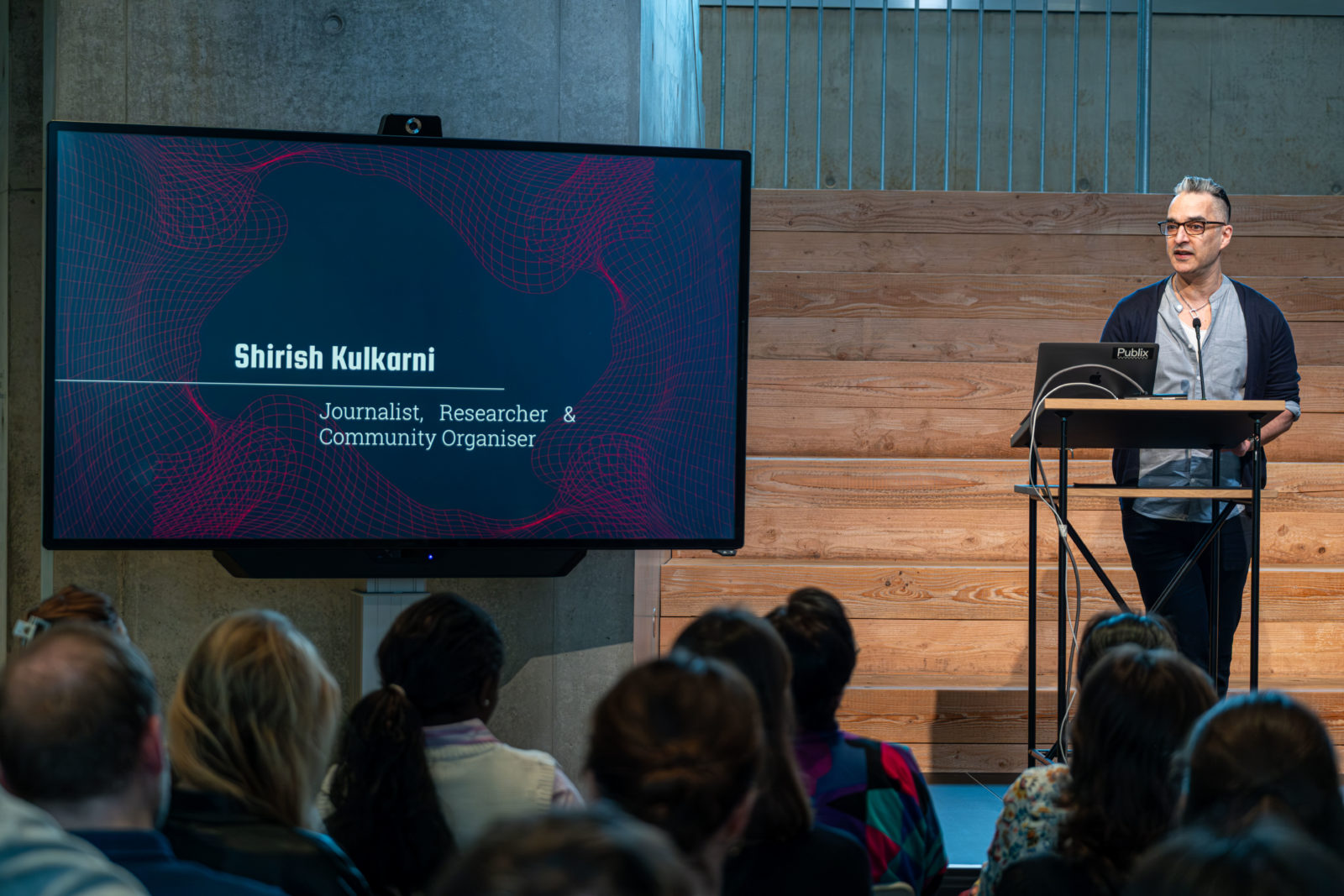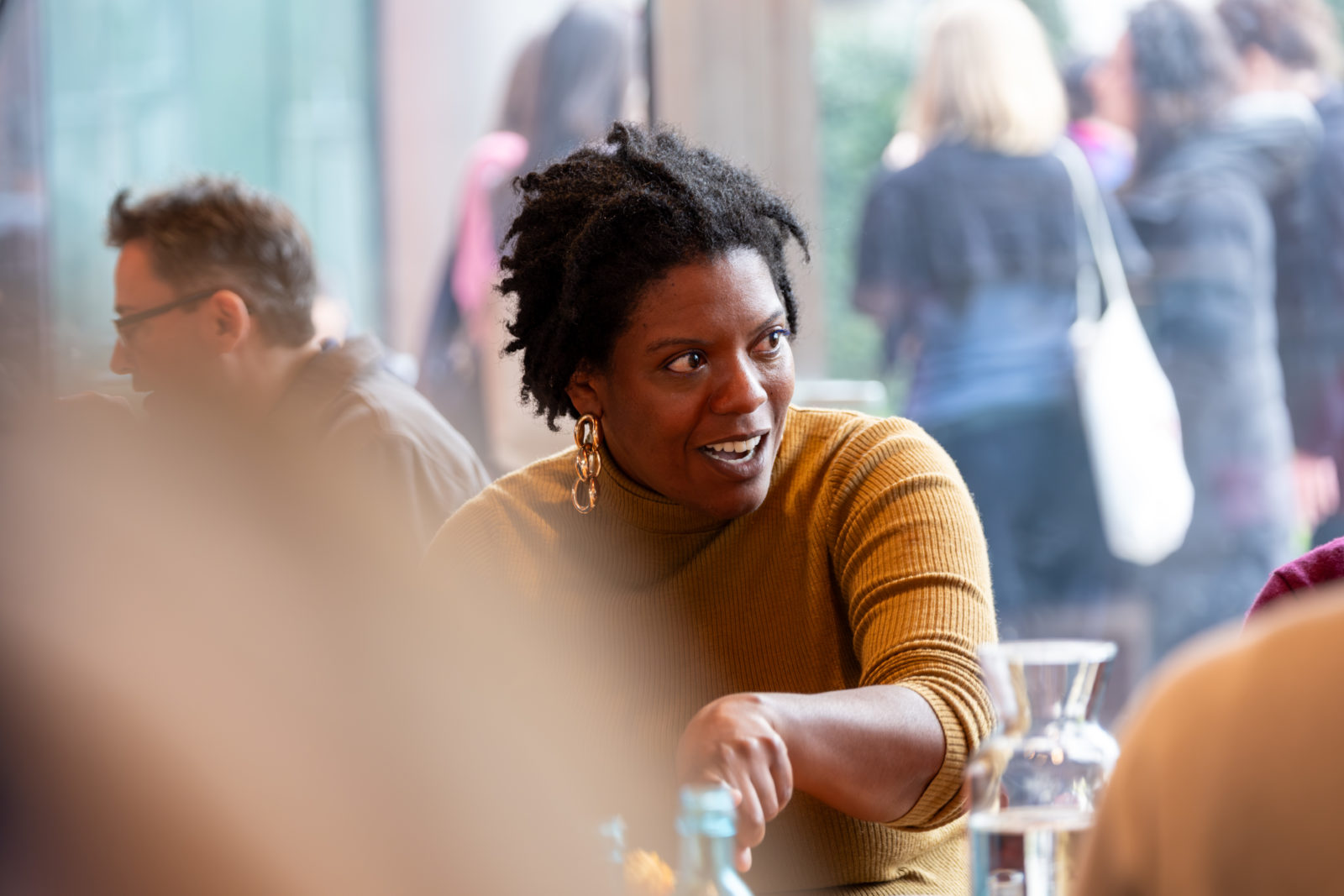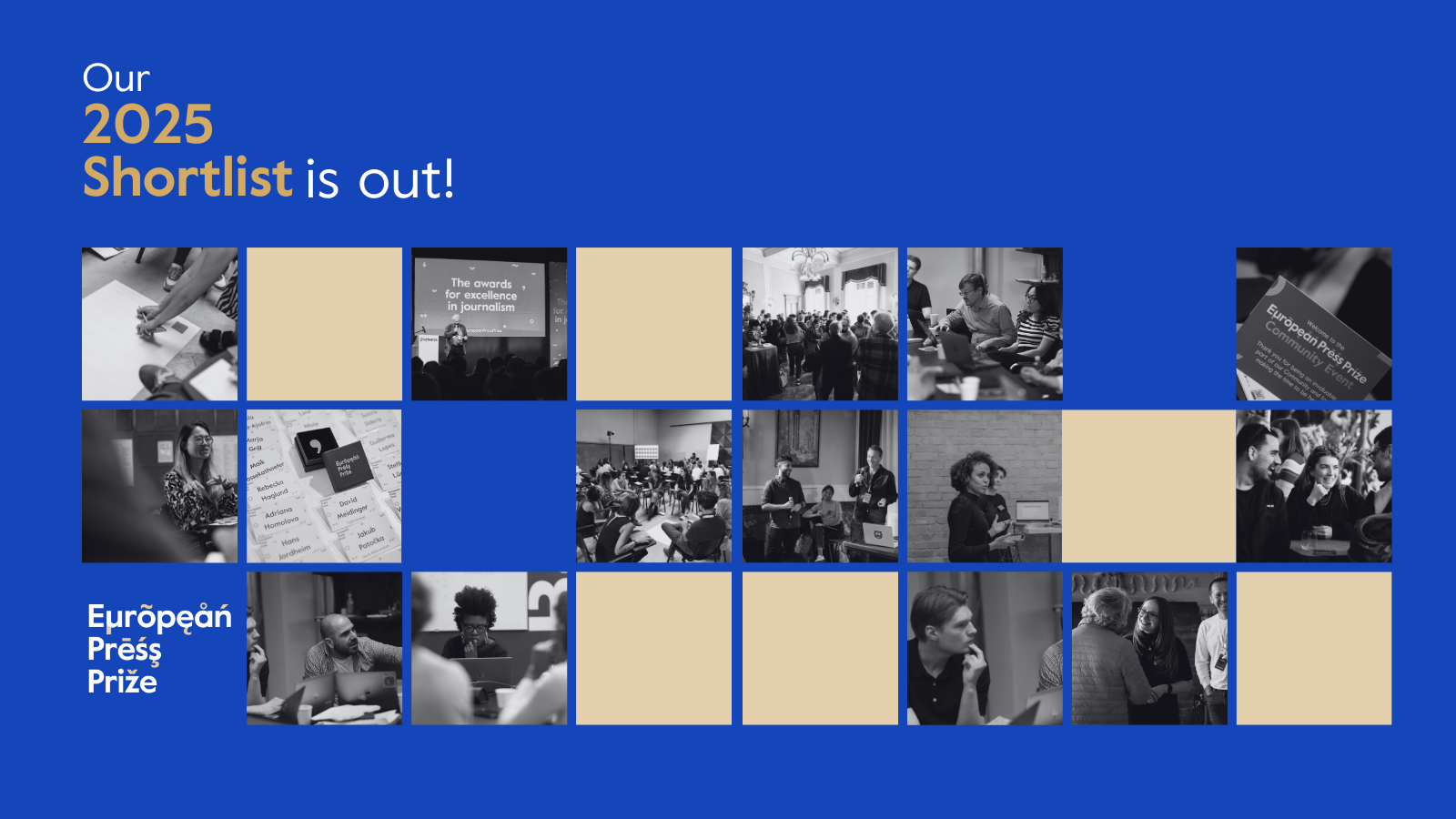The European Press Prize Shortlist 2025
The Shortlist for the 2025 European Press Prize has been announced at the International Journalism Festival in Perugia, Italy!
25 stories have been included in this year’s Shortlist across five categories:
- Distinguished Reporting Award
- Innovation Award
- Investigative Reporting Award
- Public Discourse Award
- Migration Journalism Award.
As ever, the Shortlist represents Europe’s best journalism and covers a diverse range of topics. This year’s Shortlist features stories on the Israeli occupation of parts of the Gaza Strip, forced child labour in Madagascan mica mines, motherhood at a time of global crisis, and much more.
As well as showcasing broad thematic diversity, this year’s Shortlist boasts investigations at the forefront of journalistic innovation and ingenuity, with contributors utilising techniques ranging from satellite imagery and machine learning algorithms to purpose-built tools to analyse massive datasets.
The full Shortlist is available here.
From 810 submissions to just 25 projects
Each year, the European Press Prize opens to submissions with the aim of supporting and celebrating the highest quality journalism Europe has to offer. The 2025 application period was no different with 810 submissions received from 44 countries. Of those submissions, 400 came from women journalists, 380 from men, and 9 from non-binary applicants. The remaining 21 did not wish to disclose that information. The Prize’s Preparatory Committee then narrowed down the submissions to 25 stories for the 2025 Shortlist after a series of meetings and discussions.
A tough year for independent journalism
For the third year running, our Shortlist was announced at the International Journalism Festival in Perugia, Italy. While the announcement represented a celebration of journalism, elsewhere in Perugia, speakers reminded festival goers of the dire circumstances facing many media workers around the world. This point was echoed by Cristian Lupșa, Chair of our Preparatory Committee. Lupșa said:
“This was a difficult year for judging, with many journalists under threat in increasingly authoritarian regimes across the world, and more than 100 killed in Gaza since the start of the war. These challenges were always present in our minds as the Preparatory Committee made its choices.”
Taking into account the obstacles and threats many of the applicants would have overcome in order to tell their stories, the Preparatory Committee used its expertise to narrow down the hundreds of submissions to our 2025 Shortlist.
“The Committee is an incredible group of colleagues and peers from across Europe—diverse, passionate, and deeply committed to identifying the most exemplary and impactful journalism. We’ve read hundreds of stories, had many conversations and debates, and we believe the finalists we chose reflect the urgency and importance of journalism today—standing for truth, justice, and a better world”, said Lupșa.
The projects that make up the 2025 Shortlist achieved major impact in this pursuit of a better world, ranging from key political figures citing projects in calls for legal reforms to global awareness raising and shining a light on the truth in countries where authoritarian regimes have all but silenced opposition voices.
What next?
Following the announcement, our 2025 Shortlist will be handed off to our Panel of Judges. The Panel will make the final selection of Winners and Runners-up – and choose the recipient of this year’s Special Award. Each award is worth €10,000, to be spent wherever possible on a personal project that may, in turn, enrich the practice of journalism.
This year’s Winners and Runners-up will be announced at our Award Ceremony in Bari, Italy, on 28 May.
Crisis or opportunity for change? – Conversations on the future of journalism
At the European Press Prize, we have the privilege of working alongside some of the most talented, passionate, and dedicated journalists from all around the world. When engaging with work of such a high standard, learning about the effort (and occasional personal risk) involved in its production, and seeing the real-world impact it has, it can be easy to lose sight of the fact that journalism is undergoing a period of major upheaval.
Journalism faces a range of external existential threats – take the collapse of sustainable revenue sources, shrinking press freedom, the rise of disinformation, and declines in journalist safety as just a few examples. It is important to remember, however, that some of the greatest threats to journalism can also emerge from within the industry itself.
As the world changes, so too must media ecosystems. It is vital that journalists adapt their practices to meet the needs of an evolving world, and with that, the needs of the communities they inform. This is not purely to save the industry from downfall but also to ensure it serves its audiences effectively, accurately, and equitably. This belief formed the basis of our recent one-day conference with Publix in Berlin. Throughout the event, titled “Shaping Tomorrow: Collective Efforts for the Future of European Journalism”, leading voices from the media world gathered together to explore the challenges European journalism faces and what can be done to tackle them.
Through a series of workshops, presentations, and panel discussions, journalists and industry experts put forward their innovative approaches to future-proofing their outlets. This ranged from an interactive demonstration of “live journalism” from Christoph Schwaiger and Headliner, to a conversation on the importance of media literacy within the newsroom, and a workshop on the unsettling prevalence of racist stereotypes used to drive clicks.
Among the doom and gloom that inevitably – and often understandably – surrounds many conversations on the future of journalism, were points of hope and optimism as radical solutions to the most pressing issues were presented. At the core of many of those solutions was the importance of centring the needs of communities rather than those of media businesses. This point was hammered home by journalist and researcher Shirish Kulkarni during his keynote address and later in a session titled “Conversations on the Future of Journalism”. The thought process behind this notion places immense value on audience trust as a driving force in a sustainable future for journalism. “Sustainability” in this sense does not focus purely on finances, it views journalism as a public good and emphasises the importance of information in shaping participatory democratic societies. It bases itself on principles of a media environment that serves all – specifically marginalised and often underrepresented groups – ensuring it fulfills its role of providing reliable information and allowing individuals to meaningfully engage in their communities as a result. Building trust as the foundation of journalism in this way would require more than a quick-fix solution. In Kulkarni’s words:
“We need to dismantle, reimagine, and rebuild the structures that have excluded so many people for so long.”
The structures at play in “status quo” media, as defined by Kulkarni in his keynote, represent hurdles to progressive change which must be dismantled.

Photo: Paul Alexander Probst
Trust as a key player in a sustainable future for journalism will not come about by itself. Central to that is guaranteeing universal and accurate representation in media coverage. This principle recurred regularly throughout the day’s discussions. As well as featuring in Kulkarni’s above-mentioned interventions on centring communities and prioritising trust, it was also raised in conversations related to media viability and diversity. Speaking on behalf of the independent newsroom FADA Collective, Pierluigi Bizzini stressed this point:
“We engage with civil society – activists, policy makers, and civilians. We try to involve civil society as a member of FADA Collective. We do that by going beyond traditional media. Our main goal: giving journalism back to citizens and marginalised communities.”
It was this particular quote which drove home the idea that the future of journalism – in the eyes of many of our speakers – is rooted in putting the audience first. Doing so also requires understanding audiences, who they are, and what stories of theirs need to be told. With that in mind, it is crucial that newsrooms reflect the diversity of the communities they serve. Winny de Jong, Data Journalist at NRC, emphasised this point. De Jong’s ideas for securing the future of journalism hinged on diversity of newsrooms and, in turn, diversity of output. This responsibility, however, is one that must be shared by all of those working in journalism, not merely those who represent historically marginalised communities. On this topic, De Jong said:
“Democracy belongs to all of us so diversity of perspectives is important. It is the responsibility of people who are already [in journalism], which in the Netherlands is not usually people of colour. It is too much to ask of the one person of colour in your newsroom.”

Photo: Paul Alexander Probst
While countless innovative and occasionally radical solutions were brought to the table of our conference with Publix, this quote highlights a thread which ran through them all: journalists’ responsibility.
Whether speakers were discussing collaboration with AI or big tech companies; going back to the roots of journalism and rejecting social media platforms; or working alongside communities to enhance fact-checking initiatives, they all emphasised the responsibility they have as journalists and media workers. It became clear throughout the event that in order to pave a viable route forward for the industry, journalists must reckon with the responsibility and power they bear. This means engaging with and reflecting the needs of the communities they serve, considering the impact on their audiences when pursuing technological advancements, and understanding the power of information.
Despite the negativity that invariably creeps into conversations on the future of journalism, the discussions held during the conference painted a picture of hope. It showed that the tipping point in which journalism finds itself can also be seen as an opportunity to radically change the industry for the better. As succinctly summed up by Veronika Munk, Director of Innovation and New Markets at DenníkN: “Crisis is an interesting world for journalists because we thrive on it.”


